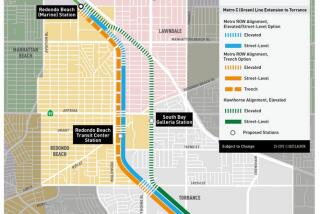Bus Line 85 Saved as Officials Bow to Riders
- Share via
They saved it. Not a rare bird or a whale, but a bus.
Regular passengers like Suzan Ross and Carmen Robles, who gathered more than 300 signatures on petitions, got transit officials Monday to abandon plans to scrap their favorite bus--Line 85--between Santa Ana and Capistrano Beach.
As a result of the intense lobbying, Orange County Transportation Authority board members approved an alternate plan by board member and San Juan Capistrano Councilman Gary L. Hausdorfer that keeps Line 85 as is and also reduces from $2 to $1 the fare on Line 205, an express bus that plies a parallel route.
“If it ain’t broke, don’t fix it,” Hausdorfer said of Line 85. “This is one of the most cost-effective lines we have. . . . Let’s let the public know we listen to their concerns.”
Line 85 was one of several route restructurings up for discussion on Monday as a result of OCTA’s $10-million shortfall in projected revenue and a slight decline in systemwide ridership caused by unemployment among former passengers.
Although Line 85 is so crowded that the CHP earlier this year ticketed bus drivers for overloading vehicles on that route, OCTA staffers said it would be more efficient to divert passengers to other existing but underutilized bus routes to carry the same loads.
Passengers loyal to Line 85 were adamant, however, that the alternate routes are not as convenient. During the past week, they persuaded Hausdorfer to support them.
Other OCTA board members also signaled their support at the beginning of OCTA’s public hearing on route changes Monday, thus avoiding long lines of would-be speakers at the microphone.
“I want to thank you for putting back the (Line) 85,” Ross told the OCTA board.
Other lines weren’t so fortunate.
For example, Line 80, the only line to traverse Costa Mesa on Victoria Street, was canceled even though Costa Mesa officials protested that they are spending huge sums to widen the street and install bus turnouts. At least for now, there will not be any buses to use the turnouts.
Other routes suffered as well, primarily through lengthening the intervals between buses from 15 minutes to 30 minutes or an hour.
In each case, however, the routes involved were among the least-used in the county bus system.
Altogether, more than 35,000 service hours were cut in order to slash OCTA’s spending plan by $2.5 million.
One woman complained that she took three buses to get to Monday’s meeting only to see the OCTA board eliminate one of them, effective July 1.
As part of Monday’s action, OCTA board members also revised the bus system’s transfer policy to eliminate the use of transfers for round trips. They also shortened the time limit within which transfers must be used from two hours after issuance to 90 minutes.
Officials said the transfers never were intended for use on return trips but that a “gray market” had developed in which some passengers were selling transfers to others for that purpose, at an estimated cost to the transit agency of $2 million a year in lost revenue.
As of July 1, transfers must be used within 90 minutes for a change in traveling direction.
In other action, Hausdorfer abstained from voting on a contract awarded to the Keith Cos. for Santa Ana Freeway right of way engineering because his wife works for the firm as a public affairs officer. Board member Dana W. Reed abstained on the same contract because of a campaign contribution.
Also at Monday’s meeting, OCTA officials said an agreement allowing OCTA to proceed with plans for new diesel-powered commuter trains between Orange County and Los Angeles may have fallen apart.
The agreement was reached with South Coast Air Quality Management District Chairman Henry W. Wedaa, who is also a Yorba Linda city councilman. The AQMD had recently opposed diesel service, except for a few select lines, pending the electrification of rail service three to five years from now.
Under the agreement with Wedaa, AQMD was supposed to support diesel-powered trains for Orange County and shift its focus to alternative fuels rather than electrification. But under an AQMD proposal to be aired at the smog agency’s session Friday, no diesel service for Orange County is specifically authorized. What’s more, any county permitted to proceed with diesel-powered service would be required to make offsetting reductions in air pollution from other sources.
OCTA officials, fearing a delay in new commuter service, said they will try to “fix” the AQMD proposal Friday by offering various amendments.
More to Read
Sign up for Essential California
The most important California stories and recommendations in your inbox every morning.
You may occasionally receive promotional content from the Los Angeles Times.










